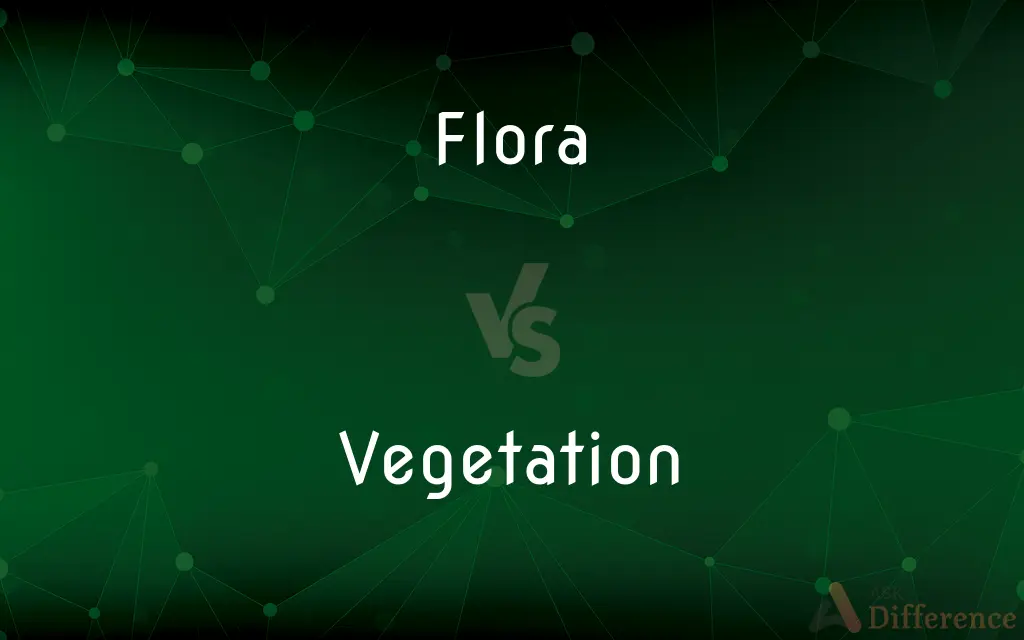Flora vs. Vegetation — What's the Difference?
By Urooj Arif & Fiza Rafique — Updated on March 7, 2024
Flora refers to the variety of plant species within a region, focusing on taxonomic classifications, while vegetation describes the physical appearance and distribution of plant communities.

Difference Between Flora and Vegetation
Table of Contents
ADVERTISEMENT
Key Differences
Flora encompasses the range of plant species in an area, emphasizing taxonomic and botanical aspects. It's about identifying and classifying different types of plants, from trees and flowers to fungi and algae. Whereas, vegetation focuses on the overall plant cover or the physical and spatial distribution of plant communities within an area. It looks at how plants interact with their environment, including density, height, and types of vegetation.
The study of flora often involves cataloging and understanding the diversity of plant species, their evolutionary relationships, and their roles within ecosystems. This includes the study of endemic species, medicinal plants, and the impact of invasive species. On the other hand, studying vegetation includes examining patterns of plant growth, succession stages, and the impact of environmental factors like climate and soil type on the distribution of plant communities.
Conservation efforts related to flora typically focus on protecting rare, endangered, or endemic plant species from extinction. These efforts might include seed banking, habitat restoration, and legal protection. Whereas, vegetation conservation looks at preserving or restoring entire ecosystems or habitats, such as forests, grasslands, and wetlands, which are crucial for biodiversity, climate regulation, and human well-being.
In scientific research, flora studies might contribute to discoveries in medicine, agriculture, and ecology by identifying new plant species and their potential uses. Meanwhile, vegetation studies are vital for understanding ecological processes, such as carbon sequestration, nutrient cycling, and habitat provision for wildlife, which inform conservation practices and land management strategies.
Flora and vegetation are both critical for biodiversity and ecological balance, but their approaches differ. Flora examines the variety and specifics of plant life, contributing to botanical knowledge and conservation, while vegetation assesses the physical and communal aspects of plants, playing a key role in ecosystem management and environmental studies.
ADVERTISEMENT
Comparison Chart
Focus
Taxonomy and diversity of plant species.
Physical appearance and distribution of plant communities.
Study Purpose
Cataloging and understanding plant species and their roles.
Examining patterns of plant growth and environmental interactions.
Conservation
Protects specific species, particularly rare or endemic ones.
Preserves ecosystems and habitats, like forests and wetlands.
Role in Research
Contributes to botanical, medicinal, and ecological discoveries.
Informs on ecological processes and land management strategies.
Relevance
Important for biodiversity at the species level.
Crucial for ecosystem function and health at the community level.
Compare with Definitions
Flora
The plant life occurring in a particular region or time, usually the naturally occurring or indigenous—native plant life.
The flora of Australia includes a vast diversity of plant species adapted to its varied climates and landscapes.
Vegetation
The process of plant growth.
Aerial photographs document the vegetation of the island over the last decade.
Flora
Plant life as distinguished from fauna, the animal life of any region.
Conservation efforts in the national park focus on preserving both the flora and fauna.
Vegetation
An encompassing term for the action or process of vegetating or growing like a plant.
The vegetation along the river banks plays a crucial role in preventing erosion.
Flora
The bacteria and other microorganisms that live in a particular environment, such as the human gut.
Probiotic supplements are intended to support the healthy flora of the digestive system.
Vegetation
Plant life or total plant cover in an area.
The dense vegetation of the Amazon rainforest is home to an incredible diversity of species.
Flora
A work or database systematically describing such plant life.
The botanist spent years compiling a comprehensive flora of the tropical island.
Vegetation
A reference to various plant types and their distribution in an environment.
Urban areas have their own unique vegetation, including parks, trees along streets, and gardens.
Flora
The aggregate of plants considered as belonging to a certain area, period, or environment.
The desert flora has adapted to survive with minimal water.
Vegetation
The physical appearance and structure of plant communities.
The vegetation varies from grassy plains to thick forests within the national park.
Flora
Flora is all the plant life present in a particular region or time, generally the naturally occurring (indigenous) native plants. The corresponding term for animal life is fauna.
Vegetation
Vegetation is an assemblage of plant species and the ground cover they provide. It is a general term, without specific reference to particular taxa, life forms, structure, spatial extent, or any other specific botanical or geographic characteristics.
Flora
The goddess of flowers.
Vegetation
The plants of an area or a region; plant life
Hills sparsely covered with vegetation.
Flora
(used with a sing. or pl. verb) Plants considered as a group, especially the plants of a particular country, region, or time.
Vegetation
The act or process of vegetating.
Flora
A treatise describing the plants of a region or time.
Vegetation
(Medicine) An abnormal growth on a body part.
Flora
The bacteria and other microorganisms that normally inhabit a bodily organ or part
Intestinal flora.
Vegetation
(uncountable) Plants, taken collectively.
There were large amounts of vegetation in the forest.
Flora
Plants considered as a group, especially those of a particular country, region, time, etc.
Vegetation
An abnormal verrucous or fibrinous growth
Flora
A book describing the plants of a country, region, time, etc.
Vegetation
The act or process of vegetating, or growing as a plant does; vegetable growth.
Flora
The microorganisms that inhabit some part of the body.
Vegetation
The act or process of vegetating, or growing as a plant does; vegetable growth.
Flora
The goddess of flowers and spring.
Vegetation
The sum of vegetable life; vegetables or plants in general; as, luxuriant vegetation.
Flora
The complete system of vegetable species growing without cultivation in a given locality, region, or period; a list or description of, or treatise on, such plants.
Vegetation
An exuberant morbid outgrowth upon any part, especially upon the valves of the heart.
Flora
All the plant life in a particular region
Vegetation
All the plant life in a particular region
Flora
A living organism lacking the power of locomotion
Vegetation
The process of growth in plants
Vegetation
An abnormal growth or excrescence (especially a warty excrescence on the valves of the heart)
Vegetation
Inactivity that is passive and monotonous, comparable to the inactivity of plant life;
Their holiday was spent in sleep and vegetation
Common Curiosities
How do flora and vegetation differ in focus?
Flora focuses on the taxonomic diversity of plant species, while vegetation is concerned with the physical appearance and distribution of plant communities.
What is vegetation?
Vegetation describes the overall plant cover and the physical distribution of plant communities in an area.
Why is the study of flora important?
Studying flora is vital for understanding plant diversity, evolutionary relationships, and potential uses in medicine and agriculture.
What is flora?
Flora refers to the variety of plant species in a specific region, focusing on their classification and botanical characteristics.
How does vegetation relate to ecosystem health?
Vegetation is crucial for ecosystem function and health, influencing water cycles, climate regulation, and habitat provision for wildlife.
What conservation efforts are focused on vegetation?
Efforts to conserve vegetation aim at preserving ecosystems, such as forests and grasslands, crucial for overall biodiversity.
Can flora and vegetation studies contribute to conservation efforts?
Yes, both are crucial for conservation, with flora focusing on species protection and vegetation on preserving habitats and ecosystems.
Are there conservation strategies specific to flora?
Yes, conservation strategies for flora often include seed banking, legal protection, and habitat restoration for endangered species.
How does vegetation impact ecological research?
Vegetation studies are essential for understanding ecological processes, such as carbon sequestration and nutrient cycling, informing conservation and management strategies.
Can flora include microorganisms?
Yes, in a broader sense, flora can also refer to microorganisms in a specific environment, like gut flora.
How do human activities affect flora and vegetation?
Human activities can lead to habitat destruction, pollution, and climate change, negatively impacting both flora and vegetation.
Can flora and vegetation studies guide land management?
Yes, insights from these studies are vital for sustainable land management, conservation planning, and restoring degraded landscapes.
What role does flora play in biodiversity?
Flora contributes to biodiversity at the species level, offering a wide range of plants with different functions and roles in ecosystems.
Why is it important to preserve both flora and vegetation?
Preserving both is essential for maintaining biodiversity, ecosystem services, and the ecological balance necessary for life on Earth.
Is vegetation only about trees and forests?
No, vegetation encompasses all types of plant life and their communities, including grasslands, deserts, and urban vegetation.
Share Your Discovery

Previous Comparison
Porter vs. Port
Next Comparison
Sorcerer vs. DruidAuthor Spotlight
Written by
Urooj ArifUrooj is a skilled content writer at Ask Difference, known for her exceptional ability to simplify complex topics into engaging and informative content. With a passion for research and a flair for clear, concise writing, she consistently delivers articles that resonate with our diverse audience.
Co-written by
Fiza RafiqueFiza Rafique is a skilled content writer at AskDifference.com, where she meticulously refines and enhances written pieces. Drawing from her vast editorial expertise, Fiza ensures clarity, accuracy, and precision in every article. Passionate about language, she continually seeks to elevate the quality of content for readers worldwide.















































